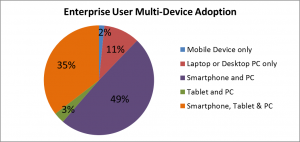 IT marketing hype has generated quite a few ridiculous and sometimes outright bizarre phrases to describe trends in technology adoption, but few on the list of the absurd top the insistence that we live in a “post-PC” era. The concept of “post-PC” derives from the (correct) fact that mobile device adoption has broadly accelerated, but makes the incorrect assumption that this is causing a substantial decrease in PC use. Nothing could be further from the truth – especially in relation to the business use of desktop and laptop PCs.
IT marketing hype has generated quite a few ridiculous and sometimes outright bizarre phrases to describe trends in technology adoption, but few on the list of the absurd top the insistence that we live in a “post-PC” era. The concept of “post-PC” derives from the (correct) fact that mobile device adoption has broadly accelerated, but makes the incorrect assumption that this is causing a substantial decrease in PC use. Nothing could be further from the truth – especially in relation to the business use of desktop and laptop PCs.
In the recently released EMA Research Report on Unified Endpoint Management – which features primary
research on the enterprise adoption, use, and management of both PCs and Mobile devices – significant evidence was revealed indicating smartphones and tablets are being adopted to supplement, rather than replace, PCs. Perhaps the most conclusive substantiation can be seen in multi-device adoption rates. 98% of all business employees that regularly use a device for their job function rely on PCs. The majority of these (87% of all) use a PC in conjunction with at least one other mobile device. While there’s no question that mobile devices have become an integral part of how users interact with business IT resources, we are still a long way from seeing mobile platforms that can perform to a level where they can actually replace the use of PCs.
Let’s face it, discussions around mobile devices replacing PCs is really only referencing tablets. The small form factor of smartphones makes them impractical for doing much more than accessing email, texting, using social media, and web surfing the few sites that are mobile friendly. To perform more productive business activities (e.g. note taking, document reviewing and broader web access), more screen real-estate is required. But the form factor of a tablet still falls way short of equaling that of a full PC. Still lacking are more accessible keyboards, extended battery power, graphics cards, fast CPUs, and large storage capacities. Additionally, the operating systems (e.g. iOS and Android), lack file systems and are not robust enough to support complex applications.
Most notably is the ability to use traditional business productivity tools for word processing, spreadsheets, and graphics preparations (such as Microsoft Office). Yes, you can get compatible software for mobile platforms, but who wants to write a 10-page document on a tablet? Or perform complex spreadsheet work? Or build a presentations slide deck? Seriously – if you don’t believe me, try it sometime! The reality of actually having to get work done negates the fantasy of Dick Tracy-style IT access.
We live in a mobile era, not a post-PC era. Get over it.




